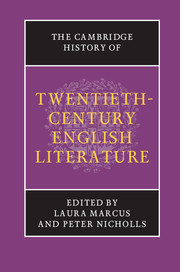Book contents
- Frontmatter
- Introduction
- PART ONE WRITING MODERNITY
- PART TWO THE EMERGING AVANT-GARDE
- PART THREE MODERNISM AND ITS AFTERMATH, 1918–1945
- PART FOUR POST-WAR CULTURES, 1945–1970
- 25 Culture, class and education
- 26 Post-war broadcast drama
- 27 Drama and the new theatre companies
- 28 Modernism and anti-Modernism in British poetry
- 29 Nation, region, place: devolving cultures
- 30 The sixties: realism and experiment
- 31 ‘Voyaging in’: colonialism and migration
- PART FIVE TOWARDS THE MILLENNIUM, 1970–2000
- Bibliography
- Index
- References
28 - Modernism and anti-Modernism in British poetry
from PART FOUR - POST-WAR CULTURES, 1945–1970
Published online by Cambridge University Press: 28 March 2008
- Frontmatter
- Introduction
- PART ONE WRITING MODERNITY
- PART TWO THE EMERGING AVANT-GARDE
- PART THREE MODERNISM AND ITS AFTERMATH, 1918–1945
- PART FOUR POST-WAR CULTURES, 1945–1970
- 25 Culture, class and education
- 26 Post-war broadcast drama
- 27 Drama and the new theatre companies
- 28 Modernism and anti-Modernism in British poetry
- 29 Nation, region, place: devolving cultures
- 30 The sixties: realism and experiment
- 31 ‘Voyaging in’: colonialism and migration
- PART FIVE TOWARDS THE MILLENNIUM, 1970–2000
- Bibliography
- Index
- References
Summary
The most far-reaching changes in the character and self-understanding of British poetry in the post-war era were set in motion in the 1950s, with the advent of a group of writers who were quickly dubbed ‘The Movement’ – names include Philip Larkin, Donald Davie, Kingsley Amis, D. J. Enright, Robert Conquest, Elizabeth Jennings, John Holloway John Wain and Thorn Gunn. Despite the collective name, the Movement was only a loose affiliation of writers, and whatever sense of group identity and common purpose these writers shared in the 1950s largely dissolved as they pursued increasingly divergent paths in later decades. But the Movement remains crucial to recent literary history because in the 19505 the writers associated with it reimagined and promoted discourses of national identity in order to make of necessity (the reduced role of Britain in world politics) a virtue. This involved complex, sometimes contradictory and provisional adaptations of an argument that set an English poetry and a tradition of Englishness in poetry over and against cosmopolitan Modernisms identified as non-native - an opposition that is at the root of divisions in British poetry that continue to influence the production and critical evaluation of poetry in the present. From our retrospective position it is possible to see Modernist and anti-Modernist discourses in post-war England as existing in a symbiotic relationship; though too much focus on them can leave important middle ground neglected, the questions the Movement raised about Modernism are among the most important literary legacies of the 1950s.
- Type
- Chapter
- Information
- The Cambridge History of Twentieth-Century English Literature , pp. 510 - 527Publisher: Cambridge University PressPrint publication year: 2005

